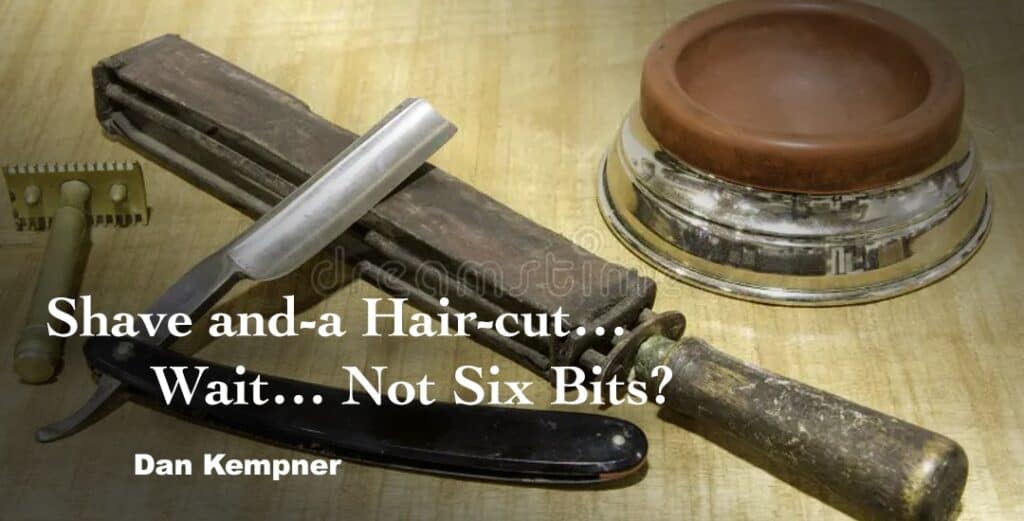Dan Kempner
Editor
For my money, all the pathos of the modern human condition can be found in Twain’s “About Barbers.”1
“All things change except barbers, the ways of barbers, and the surroundings of barbers, “ he wrote. “These never change. What one experiences in a barber’s shop the first time he enters one is what he always experiences in barbers’ shops afterward till the end of his days.”
That is true… but not strictly true. Twain’s razor eyes saw through – and perfectly described – the foibles of that venerable institution, the barber shop. But his shop was in Connecticut. Mine is in Saigon.
In Twain’s era, and even in my own father’s time, barber shops were less about haircuts – which are only needed every few weeks – than about the need for a daily shave.
Twain roasted barbers from Boston to Bologna, in print, for pain and suffering inflicted while shaving him. He even devoted a chapter to a Venitian shave in The Innocents Abroad.
But he never had a shave in Vietnam.
In part because of the fear Twain produced in me, and also due to the ascendancy of the Gillette twin-blade in my youth, I’d never had a real shave in a barber’s chair. Until today.
I needed a quick cut and the local barber’s shop is steps away, just across my little street.
The owner’s name is Đạt. He is a strongly built, pockmarked but handsome man in his 30s who bought the shop when his boss, having lost a bundle on a soccer game, sold it to him at a fire-sale price, or so the rumor went.
We had it from my wife’s old nanny, who had it from the orange-juice lady down the block, who heard it from Hiền and Lâm at the bánh cuồn breakfast stand downstairs, who got it from the former proprietor.
The place is a walk-in: there is no door in the front wall, nor is there a front wall: it’s just an open storefront with two creaky barber’s chairs inside, open to the street. This puts it well ahead of the rival shop around the corner: a ragged tarp stretched between two poles on the sidewalk every morning, between the coconut seller on one side and the compressed-air concession – for inflating motorbike tires and making simple repairs – on the other. The bald-headed barber plies his trade beneath this makeshift awning seven days a week, placing his customers on a folding chair with a stand for his tools and a bucket of water.
Đạt cut my hair, as always, and trimmed my eyebrows as usual – something Twain’s barbers never did, apparently.
He asked for no instructions and I gave none. This is not because of some deep mutual understanding, but rather because my Vietnamese is limited to things like “where is the supermarket?” though I rarely comprehend the answer. Directions as to length and style are, for the moment, far beyond me.
With signs, the proprietor asked if I wanted my ears cleaned out. From my dining-room windows I can see into his shop, and I’ve watched many times as, with a head lamp and a sort of long fuzzy Q-tip, he puts in a good ten minutes on this with many of his customers. On a recent trip to China I saw men with the same equipment cleaning the ears of tea drinkers at an outdoor cafe. It seems to be a pan-Asian specialty.
Though my wife reminds me these are, despite appearances, highly trained professionals, I’ve never indulged in the practice.
But today Đạt pointed to my bristly whiskers and I thought, what the hell. I’ll give myself a little Father’s Day pampering! Mr. Clemens notwithstanding, I took the plunge and nodded ‘yes.’
Đạt bustled about, as all barbers do, put a a cloth around my neck, sprayed my face with some cloyingly sweet-smelling liquid – they all do that, too – sparingly rubbed on a thin film of lather, and commenced.
It wouldn’t have been so bad but for the lack of understanding about beards. The preparation was sadly wanting: the careful and judicious application of heat, water and suds in proper measure. The giving to the whiskers enough time to relax. The correct level of moisture on the tender patches. It’s a sort of alchemical magic that can make or break a shave. This man broke it.
After the third dry rake, I began to feel an almost Twainian urge to scream.
But suddenly, the reasons for it occurred to me in a blood-soaked flash. Vietnamese men rarely – very rarely – have any facial hair. Despite the images of Uncle Hồ and his picturesque, if whispy, beard, the men in this land essentially do not shave. They do not need to be shaved. They know, in fact, next to nothing about the institution.
My brother in law, for example, with the highest of hope but little sense, ran out to buy a gross of razors and a gross of shaving cream the very day three lonely hairs sprouted from his young chin. He still has the same three hairs – but I got the razors and cream.
So this barber, for all his American-style expertise, had almost no practical experience with facial hair. But alas, it was too late to back out. I was committed. Like Mr. Twain, “I have
none of that enviable firmness that enables a man” to tell a barber he is backing out.
The shave was…dry. I could feel my skin begging for mercy -or for hot water at least – then surrendering, and giving up the ghost, just as Twain’s did in Venice.
And, like the brilliant author of Huck Finn, stuck there in Italy without knowing Italian, I hadn’t the words here in Vietnam.
I longed to say, “Dude! Đạt! Whatever your name is… a little lather goes a long way, my friend. Could you, pretty please, prepare my face before you skin me? It’s Father’s Day – think of the children… they’re young and they need their dad.”
But there was nothing for it but to continue. I was mute for lack of the local lingo.
But then came the bill. It was a scandal. For a shave-and-haircut, this man, this butcher, had the nerve to charge me 120,000 Vietnam đồng – about $4.50
I’ll let Twain sum up my feelings about the experience. Of his skinning in ‘About Barbers,’ he writes,
“This barber died the other day. I am going to have my revenge: I am going to attend his funeral.”
Well, I got my shave and a haircut. But at least it only cost the Vietnamese equivalent of six bits.
__________________________________________
Twain, M., & Neider, C. (1961). The complete humorous sketches and tales of Mark Twain: now collected for the first time . Hanover House ↩︎

